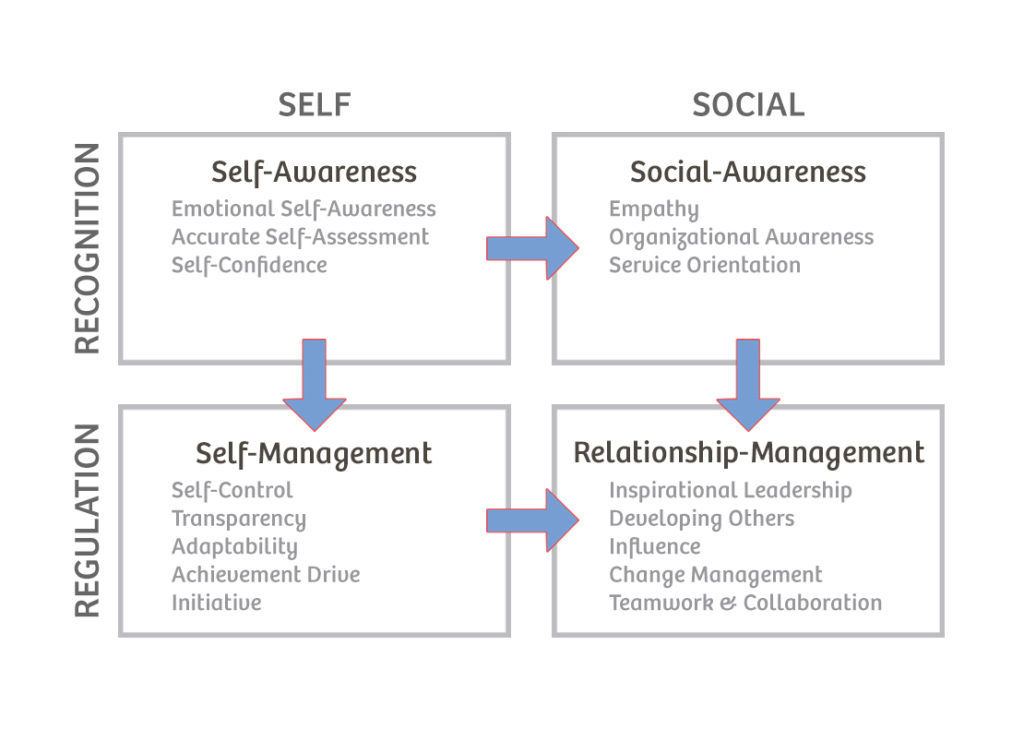What It Is:
Emotional Intelligence (EI or EQ) is a concept attributed to Daniel Goleman (1995). It refers to the ability to recognize, understand, manage, and effectively use one’s own emotions, as well as to recognize, influence, and manage the emotions of others. Goleman identified five components of emotional intelligence:
- Self-awareness:
- Recognizing and understanding one’s own emotions.
- Self-regulation:
- Managing and controlling one’s emotions in various situations.
- Motivation:
- Being driven to achieve goals and having the ability to motivate oneself.
- Empathy:
- Understanding and sharing the feelings of others.
- Social Skills:
- Managing relationships, building networks, and navigating social complexities.
Emotional intelligence is crucial for creating a positive and productive team environment in Agile settings. By integrating emotional intelligence principles into coaching practices, you can enhance team dynamics, communication, and overall performance.
How to Use It:
Using Emotional Intelligence in Agile Coaching:
- Self-Awareness for Agile Coaches:
- Encourage self-awareness among team members and within the coaching role. Promote reflection on emotions and their impact on interactions.
- Emotional Regulation:
- Help team members develop emotional regulation skills. This includes managing stress, staying calm under pressure, and fostering a positive emotional climate.
- Motivating Agile Teams:
- Connect the team’s work to a larger purpose. Motivate team members by helping them see the impact of their contributions on project success.
- Empathy in Collaboration:
- Emphasize the importance of empathy in collaboration. Encourage team members to understand each other’s perspectives and feelings to build a more cohesive and supportive team.
- Building Social Skills:
- Develop social skills within the team, including effective communication, conflict resolution, and active listening. Create an environment where relationships can thrive.
- Handling Conflict:
- Teach conflict resolution skills. Help team members navigate conflicts by understanding and addressing the underlying emotions.
References:
- “Emotional Intelligence: Why It Can Matter More Than IQ” by Daniel Goleman:
- Goleman’s book provides an in-depth exploration of emotional intelligence and its significance in personal and professional life.
- Daniel Goleman’s Writings and Talks:
- Explore articles, interviews, and talks by Daniel Goleman on the subject of emotional intelligence.
- Emotional Intelligence Assessments:
- Use validated emotional intelligence assessments as tools for individuals and teams to understand and develop their emotional intelligence.
- Training Programs and Workshops:
- Participate in training programs or workshops that focus on developing emotional intelligence skills, especially in the context of leadership and teamwork.
- Psychology and Leadership Journals:
- Read articles in psychology and leadership journals that discuss the impact of emotional intelligence on team dynamics and leadership effectiveness.
- Online Courses and Webinars:
- Enroll in online courses or attend webinars that cover emotional intelligence, its components, and practical applications.
Visit the Agile Coach’s Toolkit for more definitions, models, theorems and stuff.

